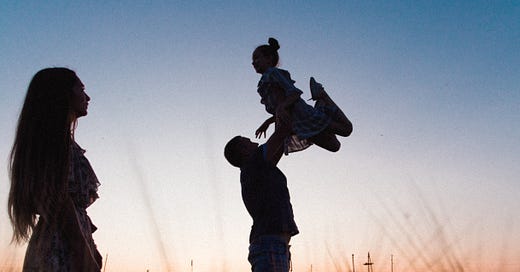I’m writing this post on my flight back to Vietnam from Thailand, where I and my partner had just spent over two weeks on a summer vacation of food, family, and more food. I’m typing these words on my phone, something I rarely do for I prefer the larger screen and keyboard on my laptop. But today, I am making an exception. Half-formed ideas for today’s post are swirling insistently in my head, begging to be let out. So here I am, strapped in and typing away on my tiny Google keyboard.
Just under a week ago, we were traveling in the North of Thailand with my uncle and aunt. My uncle owns a big eyeglasses store that he’s been running for several decades and is now passing onto his son. While tirelessly driving us through province after province,1 he told us the story of how he opened his store all those years ago and turned it into the success it now is. Conversation drifted to how he doesn’t mind his son introducing new management approaches, and he said these words that immediately imprinted themselves in my mind—“it’s his future, not mine.”
Drawing the line
Ever since hearing my uncle’s words, I've been mulling over how many relationships—be it familial, romantic, platonic, or else—lay wrecked by the failure to acknowledge that someone’s future is theirs, not yours.
The parent who obsesses over their child’s choice of college and degree, the partner who demands to have a say in every decision, the friend who always rushes to the rescue regardless of whether they should or not.
At what point does it become clear that the parent/partner/friend are appropriating their child/partner/friend’s future as their own and robbing the latter of ownership and accountability? At what point does the latter’s relief and gratitude turn into dismay and resentment? When does helping become interfering, caring turn to smothering?
Where do we draw the line that should not be crossed?
Learning to let go
“It’s your future, not mine,” may sound harsh, but I think it’s the kindest and most empowering thing we can say to someone. It’s recognising their autonomy to choose the future that they want, regardless of whether or not we want it for them.
We may think we know better, and we may know better, but at the end of the day, it’s not our lives to live—everyone is entitled to their own future, however poor the choices they may make.
As for me, I have a bad habit of superimposing my worldview onto other people’s lives. I’d think, why doesn’t X/Y/Z live their lives in the way I’ve worked out is optimum? Hearing my uncle’s words was a rude awakening—it’s their future, not mine.
If they don’t keep fit/eat well/work conscientiously/live mindfully/[insert way of life you wish for the people you care about], then it’s really none of my business. It’s not my place to wish for them a future they do not choose.
In fact, if you think the idea behind this post is bollocks and helping shape the future of those you care about is the right way, then that’s entirely within your rights and, again, none of my business.
I have to learn to respect others’ life choices, and let go.
What do you think?
It’s not often that I hear a phrase that immediately stuck, and even rarer to feel such a strong impulse to write that I have to get my thoughts out in mid-air. So I’m curious to hear if my uncle’s words—it’s his future, not mine—have a similar impact on you.
Should we leave other people’s futures alone? Or do we have a role to play in the lives of those we care about?
Send a reply, leave a comment, share this with someone whose future you care about.
Until next Friday… Stay thoughtful,
Val
Photo by Klara Kulikova on Unsplash
We covered 6 provinces in one day, stopping in 5 for shopping, touristing, and—of course—fooding.








I do think it's a delicate dance to get involved vs. let go in others' decisions, especially for those you genuinely care about and have their best interests in mind. Ultimately, I believe we can voice our care and opinions as long as it's coming from a place of love and understanding, BUT the key is to not feel attached to our own advice (and not get frustrated when they don't take it on).
This question really reminds me of my relationship with my younger brother, who's 12 years younger than me! A lot of times, I impose my ways on him because, duh, I know better! Recognizing that this is my own ego talking, I've come to embrace his opinions and methods that are different from mine. We all have our own ways of doing things and we'll never know which is "better" or "worse".
I guess the challenge is when our futures are, to whatever degree, intertwined.